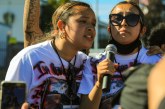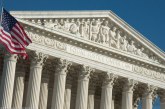 That is a question that the California State Supreme Court will now grapple with as the court decided last week to rule on whether sponsors of ballot initiatives have special authority under state law to defend the measures in court when state officials refuse to do so.
That is a question that the California State Supreme Court will now grapple with as the court decided last week to rule on whether sponsors of ballot initiatives have special authority under state law to defend the measures in court when state officials refuse to do so.
Last month, the 9th Circuit Court of Appeals asked the California Supreme Court to weigh in on the decision of standing.
At stake is whether Proposition 8 will fail due to narrow, procedural grounds that has limited impact, or whether the case ultimately will reach the US Supreme Court which can then rule on the broader constitutional questions as to whether or not people are entitled to equal protection under the constitution, and whether that means states cannot deny same sex couples the same rights and privileges under the law that two-sex couples are currently granted.
The time-table for this looks like an early September hearing with a decision by the end of the year.
Recall that this same Supreme Court ruled in a 4-3 verdict back in 2008 to overturn the ban on same sex marriages, arguing that it violated the rights of gays and lesbians. That allowed tens of thousands of same sex couples to wed prior to November of 2008 when voters narrowly voted to reinstate the ban.
At that time, Governor Arnold Schwarzenegger and Attorney General Jerry Brown refused to defend Proposition 8 in the courts. Newly-elected Governor Jerry Brown and Attorney General Kamala Harris have vowed the same, in distinction to their election opponents who both would have defended the ballot measure.
When the ballot measure and ban were challenged in federal court, Judge Walker forcefully ruled that the ballot measure was unconstitutional.
According to a report in the LA Times this week, “When the 9th Circuit heard arguments in the Proposition 8 case in December, a majority of the three-judge panel appeared to believe that the ballot measure violated the federal Constitution. But the panel also suggested that the case could be decided on a procedural issue.”
Protect Marriage is the group that had sponsored Proposition 8. When they tried to appeal the ruling, the judges in the 9th Circuit said it was unclear whether the group had legal standing to do so.
According to the Times, “The state court has been deferential to ballot measures in the past, and both conservative and liberal groups are expected to urge the justices to give initiative sponsors special legal status.”
However, gay rights groups have indicated that they would accept a more narrow victory that overturns Proposition 8 on procedural grounds, a move that would avoid a risky fight at the Supreme Court level.
Right now, such a fight would hinge on swing vote Anthony Kennedy’s decisions. Observers are split on what he might do, though he is thought to lean toward supporting same sex marital rights.
“We are confident that the California Supreme Court will conclude that initiative sponsors do not have the right to override our elected leaders and independently defend an initiative,” Kate Kendell, head of the National Center for Lesbian Rights, said after the state court’s vote.
On the other hand, lawyers for proposition 8 argued, “Surely the momentous issue of Proposition 8’s validity under the federal Constitution should not be determined by an unreviewed trial court decision.”
However, the LA Times brings up potentially another problem, “[Judge] Walker’s ruling invalidating Proposition 8 might be deemed to apply only in the two counties, Los Angeles and Alameda, that were named as defendants in the lawsuit challenging the initiative.”
Moreover they cite 9th Circuit Judge Stephen Reinhardt who said in a concurrence that “the consequences are unclear” for Proposition 8 if the appeal must be dismissed for procedural reasons.
Judge Walker’s order “determines only that Proposition 8 may not be enforced in two of California’s 58 counties,” Reinhardt wrote.
In the meantime, recent polling suggests that the legal fight, at least in California, may be increasingly becoming a moot point. Polling shows that a narrow plurality of Californians now favor the right for same sex couples to marry, and three-quarters favor some kind of special legal status for such relationships.
These data suggest that gay rights supporters may simply be able to overturn Proposition 8 through a vote of the people.
Demographic shifts show that oldest generations have the most resistance to same sex marriage, but as the demographics shift, younger people are strongly in favor of same sex marriage.
It is only a matter of time, at least in California, and probably the rest of the nation eventually, before there is a strong consensus for same sex marriage, which will render most of these fights moot.
—David M. Greenwald reporting






dmg: “It is only a matter of time, at least in California, and probably the rest of the nation eventually, before there is a strong consensus for same sex marriage, which will render most of these fights moot.”
The rest of the nation? I very much doubt it…
“Judge] Walker’s ruling invalidating Proposition 8 might be deemed to apply only in the two counties, Los Angeles and Alameda, that were named as defendants in the lawsuit challenging the initiative.”
This is obviously the path that will have the most political appeal. This was also the recommendation of the lawyers arguing against Prop 8 before the 3rd District Federal Court. They both do not want to bring in the other states that the decision would control as they would be stirring up a political “hornet’s nest” in these states that have overwhelming voter opposition to including same-sex unions in the definition of marriage,especially, as we go into the 2012 election cycle. For those legal scholars out there, is there any precedent for the Federal Court refusing an appeal based upon lack of standing and not having its ruling applied to its entire jurisdiction? The Federal Courts have sole jurisdiction as to the validity of standing before their court and the decision of the CA Supreme Court is legally totally irrelevant. A Ca Supreme Court decision to accept Judge Walker’s decision to invalidate the CA constitution without any defense by the CA elected officials sworn to defend the CA constitution, along with a decision of the 3rd District to create a special ruling that limits the political fall-out of its decision has the potential to seriously erode public respect for the legitimacy of the 3rd District Federal Court and the populist legal principles that are the foundation of California’s system.
For anyone interested, Pew did a major poll on the gay marriage question last October ([url]http://pewresearch.org/pubs/1755/poll-gay-marriage-gains-acceptance-gays-in-the-military[/url]). It found there is still a majority or plurality opposed to gay marriage in just about all groups, but the direction of change is moving in favor of legalizing gay marriage.
I found this Pew graph, which shows a breakdown of various age groups, most interesting. The younger the group the more likely they support gay marriage.
[img]http://pewresearch.org/assets/publications/1755-3.png[/img]
I have thought for some time, as the older folks die off and are replaced by the younger, that (as David said) it’s just a matter of time before a solid majority of Americans favors non-discrimination in marriage. But I concede it is possible that is not the case. What might just happen is that as folks age, they become more conservative. If so, the groups born later on that graph will become less likely as they get older to support gay marriage.
I think that same sort of trend applies to marijuana legalization. If you had polled people born in the 1950s, say in 1975, and asked them if they favored legalization of pot, maybe a majority would have said yes. But if you ask that same group the same question now, the percentage saying yes would probably have declined substantially, due to the conservativizing nature of aging. (Or maybe the pot smokers among them just all died off?)
“What might just happen is that as folks age, they become more conservative.”
An important observation since, unlike most “third world” countries, our population is aging with an ever increasing majority of older voters. It is worth noting that NO state has redefined the meaning of marriage to include same-sex unions by the popular will of the majority of their voters.
[quote]davisite2
It is worth noting that NO state has redefined the meaning of marriage to include same-sex unions by the popular will of the majority of their voters.[/quote]
Civil rights are rarely granted by a vote of the people in any state or our nation as a whole. In fact, our civil rights have historically been established and expanded by the courts (both state and primarily federal) and to a lesser extent by state legislatures and the congress which have amended their respective constitutions to eliminate discriminatory laws and expand civil rights.
A vote of the people did not end slavery or segregation, nor eliminate “separate, but equal” Jim Crow laws. A vote of the people did not desegregate schools and public accommodations, nor did a vote of the people give women equal rights including the right to vote and eventually protect a woman’s right to choose. A vote of the people did not foster disability rights or protections for gay and lesbian people in housing, employment. A vote of the people did not end “don’t ask, don’t tell.” A vote of the people did not eliminate miscegenation laws nor will a vote of the people extend full civil rights to gay, lesbian, bisexual or transgender people, including marriage equality.
In fact, a vote of the people has usually been used to take civil rights away from people or prevent rights from being extended to additional classes of people. Court decisions, and again to a lesser extent legislation, have been the key methods by which our fellow human beings of all genders, races, ethnic and national origins, creeds and sexual orientations have received equal protection under the law.
[quote]E Roberts Musser
dmg: “It is only a matter of time, at least in California, and probably the rest of the nation eventually, before there is a strong consensus for same sex marriage, which will render most of these fights moot.”
The rest of the nation? I very much doubt it… [/quote]
Elaine, I hope you are wrong. I instead hope the following happens, as we have seen with other prejudices—that usually overtime as most people grow in knowledge, awareness and get accustomed to working and living side by side with people they had previously held prejudicial (racial, ethnic and religious) views & feelings towards those feelings usually moderate if not completely go away, unless of course the person is an outright bigot. I hope it will be the same with gay people, some of whom are now married (gay marriage is now legal in five states and DC as well as the 18,000 California same-sex marriages performed in 2008 prior to Proposition 8 passing which remain valid.) As more and more gay folks become married and as they take their rightful place openly and proudly in our society hopefully these prejudices will fall away.
I agree with David that here in California in the near future gay marriage will become legal. As prejudice and discrimination against gay folks continues to recede, and people’s understanding and wisdom grows, the rest of the nation will probably within another 10 years support marriage equality too—with polls reflecting that the majority of our citizens support the freedom for gay folks to be married.
The refusal of the State Attorney General to defend the CA constitution, with its Prop 8 provisions unanimously declared to be valid by the CA Supreme Court, was a betrayal of the checks put in place by the CA voters in response to the flagrant overreaching and abuses of the CA court system in the 19th century.
“A vote of the people”
Legislative action is the vehicle for the will of the people, not necessarily a voter referendum.
“…nor did a vote of the people give women equal rights…”
This is an interesting example. Women won their substantive civil rights as their society defines the term, “woman”, with its recognizable features. distinctive from “men”.
Hawaii will legalize gay marriage on Wednesday. Another step forward.
[quote]Honolulu Star-Advertiser
Feb 18, 2011
Gov. Neil Abercrombie announced today that he will sign the civil unions bill Wednesday at Washington Place, a day earlier than originally scheduled.
The ceremony will take place at 2 p.m. Video will be streamed live at the governor’s website at http://hawaii.gov/gov.
The state Senate on Wednesday voted 18-5 to give final legislative approval to Senate Bil 232, which would legalize civil unions in Hawaii. The bill allows all couples — same-sex and heterosexual — to enter into a civil union, a legal status with all the rights, benefits, protections and responsibilities as traditional marriage.
Hawaii would become the seventh state to grant civil unions to same-sex couples without authorizing marriage itself. Five states and Washington, D.C., permit same-sex marriage.[/quote]
BR: “Elaine, I hope you are wrong. I instead hope the following happens, as we have seen with other prejudices—that usually overtime as most people grow in knowledge, awareness and get accustomed to working and living side by side with people they had previously held prejudicial (racial, ethnic and religious) views & feelings towards those feelings usually moderate if not completely go away, unless of course the person is an outright bigot.”
The problem here is you are assuming those opposing gay marriage are “prejudiced” against gays, which may or may not be true…